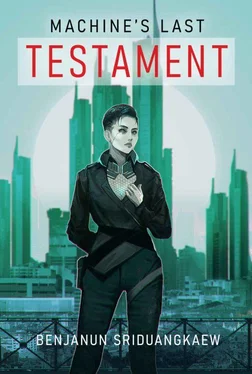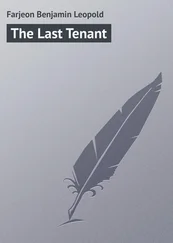The new note from Klesa references the fable of a spider and its web shimmering in rain; it is in code, leaning on allegories and epics and poetry that Suzhen knows. To her guidance it would appear she’s simply transcribing texts from memory for the sake of it, a little like practicing calligraphy. She translates as she reads, not an exact science, but there is a set of keywords she and Klesa agreed upon beforehand. The AI, from the sound of it, infiltrated Deratchan briefly and discovered two facts: that Deratchan has an architecture identical to Samsara’s and that until recently, ze was part of a small closed network. Zer sibling units, all created just months past, number forty. Before their disconnection and deployment to Anatta, Deratchan—or zer siblings—met with a prisoner in Samsara’s custody. Almost certainly, that prisoner is held where Deratchan’s siblings reside.
Suzhen snaps the book shut. The noise of it is abrupt as a gunshot, scattering the particulate butterflies that have crowded onto her shoulder. Some quirk of programming cracks them into loose, monochrome crystals. They tinkle onto the floor and dissolve.
She puts the notebook away. In the kitchen she makes jasmine tea and pours it into a chilled glass, turned to maximum. The temperature adjusts in seconds, and when she drinks the tea it is flavorless and arctic. She nearly gags on it, the cold slipping down her throat like a knife. It sobers her. She might have read Klesa’s missive wrong. Klesa might have misunderstood the situation or misunderstood her. Only no, xe would not. Not with this.
Her breath rattles in her windpipe. She takes another drink, letting it warm up in her mouth this time. It goes down easier. Her nerves steady, regain some equilibrium. The thought of Ovuha being alive after all. Klesa included that information as a passing remark— a wasp splendid and dear to the poet’s gaze, kept between life and death upon the spider’s delight —and she can hardly ask for more until she sits down with the AI again. She’ll have to wait.
Deratchan returns with groceries, bright-eyed and smug. “I bought these from a human-run orchard,” ze says, showing her a hamper of fresh-picked fruits: yellow-green carambolas, pitayas as red as intestines, longan cultivated to platinum sheen. “Their staff are all human. Yet the entire time they couldn’t tell I was machine! I tried to give hints, to make the game fair, but it didn’t occur to them I might not be of their kind.”
“You seem to be enjoying yourself.” Suzhen takes a gilded longan. On peeling it she discovers the flesh is pearlescent. It tastes subtly of oolong. “I must warn you humans are, collectively, very disappointing.”
The machine grins; despite zer plain features ze does have a particular charm, zer face mobile and expressive. “You haven’t disappointed me at all. I’m thinking of assigning myself a false identity, I could work at a fertility center and arbitrate birth licenses. It would be a fine way to meet all kinds of people. I’ll need a surname, won’t I? We could be relatives, maybe even siblings? Or married, that might be more believable. I can get the documentation taken care of.”
Suzhen’s smile freezes. “That might be stretching it. My friends would be very upset to find me suddenly wedded and you never having been introduced before, and they know I have no living family.”
“Ah, perhaps you met me at work? You can dress me up and show me off at social gatherings. We could have so much fun. I’ll wear anything you like.”
“We can arrange something,” she says, and wonders if Deratchan has pored over her guidance’s records. Ze must have. These deliberate parallels, inching toward replicating her time with Ovuha, this forced closeness. Without Klesa, and with more time, she might even have fallen prey to it: accepted Deratchan as a gift, a substitute to fill the void that Ovuha left behind and which Taheen does not want to—or cannot—make whole.
She is as weak as any open wound.
When she goes to sleep, Deratchan curls up at the foot of her bed like a cat. On the first few evenings ze offered to join her in bed outright— I can be a companion to you in all things —but she quickly demurred. The compromise is oddly comforting, Deratchan’s soft head nuzzling her ankle, the warm presence. Perhaps what she needs is a cat. A replicant one that’s always affectionate and warm and present, and which will keep her apartment from being empty.
After a while she rises, making sure not to dislodge Deratchan, though she knows ze’s not asleep. Ze obliges by staying put and not asking her where she is going. Still she tiptoes, though her feet make hardly any sound on the floor tiles in any case.
Despite having lived in this complex for her entire adult life, she has never left her place at odd hours, save to respond to emergency calls. She doesn’t know her neighbors, has passed them only in the elevator or rarely the corridor: there are only two other units on her floor. It feels daring to be about in her nightwear, even if she’s thrown on a robe. Her building is wide and, like most of Indriya, looks like a column of black opal from the outside interspersed by the floors’ layers of topiary, glades, orchards. Individual apartments are centered around a cardinal point. Hers is southwest, an august direction for her personally, not that she’s ever paid much attention—she got this room through happenstance, this being the last one available at the time. Her first time living alone, her first time living as a full citizen, class prime. At that point she did not take it for granted. Each day she lived here she was wary, as if any moment she might be found out and evicted, her citizenship annulled.
But the marriage of convenience Bhanu had arranged for Xinfei held through the end, even if Xinfei barely lived with her nominal spouse, a mousy woman with a passion for moths. Suzhen neither liked nor disliked her, and tried to pay her respects when she could, those due a kindly aunt. That woman never demanded much from Suzhen, and none at all from Xinfei. She had a debt to Bhanu; everyone owes Bhanu something. He is the nucleus inside a complex lattice of obligations, deadly and not.
She takes the lift to the roof, meeting no one on the way. There is an otherwhere quality to the night, a quiet created by absence and the distance of aerial traffic. She could believe the building has been abandoned, all of Indriya abruptly emptied of people save herself, and that she’s stepped into a version of the city from before Anatta’s restoration.
At the building’s summit the compass motif is more explicit, narrow terraces demarcated to north and south, east and west. Tall trees with dark trunks and darker fruits. A chill passes through her when she thinks back to Klesa’s jungle, a momentary echo between there and here, but it passes. There’s no real resemblance, no orchids.
She finds herself a seat on the southern terrace, metal and stone carved into a pomegranate several times her size. It contours to her so quickly it feels like being swallowed. Pulling her robe tighter around herself—the same robe she loaned to Ovuha—Suzhen composes a short, brusque message and sends it to one of Bhanu’s randomized dead drops. Typically it may not reach him for days, or a month.
He responds immediately.
“Good of you to call,” he says. “We need to talk.”
“Yes.” She is, infinitesimally, relieved: he already knows. “Did you find—”
“Your potentiate. I traced the surgeon who reconstructed her face, and it turns out he was meticulous with his records.” There’s no visual to their connection—there rarely is from his end—but she imagines him leaning back, weighing the moment. “Unless I’m mistaken, I’ve seen the face she was born with. I know who Ovuha Sui was.”
Читать дальше












